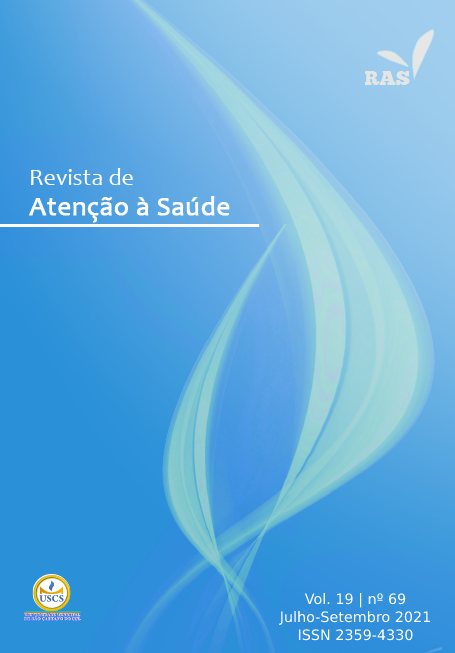Determining psychological aspects of food behavior in children and adolescents with overweight or obesity
DOI:
https://doi.org/10.13037/ras.vol19n69.7598Keywords:
Eating behavior, Overweight;, Child obesityAbstract
Overweight and obesity are a conditions resulting from eating behaviors determined by the action of a multiplicity of factors inherent to the subject`s functionality as an integrated bio-psycho-social system. Research objective: Study of determinants of eating behavior in overweight or obese children and adolescents. Participants: 50 children and adolescents diagnosed with overweight/obesity, aged between 7 and 18 years, and another 50 with equivalent sociodemographic characteristics, which constitute the control group defined by weight and BMI criteria within standardized parameters. Methodological instruments: Clinical-psychological interview; sociodemographic questionnaire; Eating Behavior Questionnaire (EBQ). Results: Children and adolescents with overweight/obesity, compared to those in the control group, show significantly higher BMI and values of the “external food intake” dimension, with statistically significant differences. In the dimensions “food restriction” (less expressive) and “emotional food intake” (more expressive), the statistical differences are not significant, as to the number of inducers involved, but relate to the intensity or frequency of action. Conclusions: In overweight and obese children and adolescents, eating behavior was induced by sensory and cognitive-emotional determinants in conjunction with deficient concern and willpower in situations and circunstances. The latter required restriction of the quantity and types of food ingested, concerning eating habits and style. Eating behavior, in the perspective of psychological dependence, involves processes of emotional immersion, cognitive colonization, motivational submission and volitional subsidization.
Downloads
References
Ganzen VA. Descrições sistémicas em psicologia. Leninegrado: Universidade Estatal de Leninegrado; 1984.
Lomov BF. Problemas teóricos e metodológicos da psicologia. Moscovo: Ciência; 1984.
Morin E. La complexité humaine. Paris: Flammarion; 1994.
Pereira FO. Teoria Sistémico-Integrativa do Psiquismo Humano. Revista Teoría y Crítica de la Psicología. 2018; n. 10, 1—23. http://www.teocripsi.com/ojs/(ISSN:2116-3480).
Ahrebs W, Pigeot I. Fatores de risco da obesidade infantil: Lições do Estudo Europeu IDEFICS. In ML Frelut (Ed.), The ECOG`s eBook on Child and Adolescent Obesity; 2015. Retirado de ebook.ecog-obesity.eu
Médicos do Mundo. Como se previne a obesidade infantil?, s. d. Médicosdomundo.pt/noticia/como-se-previne-obesidade-infantil. Recuperado 3 de Julho de 2020.
SNS (Serviço Nacional de Saúde). Obesidade Infantil em Portugal, 2019. sns.gov.pt/noticias/2019/07/10/Portugal-obesidade-infantil-2/. https://www.dgs.pt/. Recuperado em 3 de Julho de 2020.
ABESO (Associação Brasileira para o Estudo da Obesidade e da Síndrome Metabólica). Mapa da obesidade. Abeso, 2015. Disponível em: <http://www.abeso.org.br/atitude-saudavel/mapa-obesidade>.
Moraes JM, Caregnato RCA, Schneider DS. Qualidade de vida antes e após a cirurgia bariátrica. Acta Paulista de Enfermagem. 2014; 27, 157-164. doi: 10.1590/1982-0194201400028.
Frontzek LGM (Org). Obesidades e psicologia. Porto Alegre: Juruá; 2015.
Frontzek LGM, Bernardes LR, Modena CM. Obesidade infantil: Compreender para melhor intervir. Rev. Abordagem Gestaltica. [online]. 2017; vol.23, n.2, pp. 167-174. ISSN 1809-6867.
Nunes MA, Appolinario JC, Abuchaim ALG, Coutinho W (eds). Transtornos alimentares e obesidade. Porto Alegre: Artmed; 2006.
Freitas FC. A janela da escuta. Relato de experiência clinica. Belo Horizonte: Editora Scriptum; 2014.
Melo ED, Luft VC, Meyer F. Obesidade Infantil: como podemos ser eficazes. Jornal de Pediatria. Porto Alegre – Rio Grande do Sul. 2003; v. 80, n. 3, pág: 1 a 16, maio/junho.
Reis CEG, Vasconcelos IAL, Barros JDN. Políticas públicas de nutrição para o controle da obesidade infantil. Revista Paulista de Pediatria. 2011; 29, 625-33. doi: 10.1590/S0103-05822011000400024.
Poulain JP. Sociologia da obesidade. São Paulo: Editora Senac; 2013.
Carvalho EADA, Simão MTJ, Fonseca MC, Andrade RGD, Ferreira MSG, Silva AF, Fernandes BS. Obesidade: aspectos epidemiológicos e prevenção. Revista Médica de Minas Gerais. 2013; 23, 74-82. doi: 10.5935/2238-3182.20130012.
Marchi-Alves LM, Yagui CM, Rodrigues CS, Mazzo A, Rangel EML, Girão FB. Obesidade infantil ontem e hoje: importância da avaliação antropométrica pelo enfermeiro. Escola Anna Nery 2011; 15, 238-244. doi: 10.1590/S1414-81452011000200004.
Melo TR., Jansen AK., Pinto R. DMC., Morales R. R. D., Morales NM, Prado MM, Silva CHMD. Qualidade de vida de cuidadores de crianças e adolescentes com sobrepeso ou obesidade. Revista Escola de Enfermagem USP. 2011; 45, 319-26. doi: 10.1590/S0080-62342011000200003.
Andrade TDM, Moraes DEBD, Ancona-Lopez F. Problemas Psicológicos e Psicodinâmicos de crianças e adolescentes obesos: relato de pesquisa. Psicologia: Ciência e Profissão. 2014; 34, 126-141. doi: 10.1590/S1414-98932014000100010.
Turco G, Bobbio T, Reimão R, Rossini S, Pereira H, Barros Filho A. Quality of life and sleep in obese adolescents. Arquivos de neuro-psiquiatria. 2013; 71, 78-82. doi: 10.1590/S0004-282X2013005000008
Assunção MCF, Muniz LC, Schäfer AA, Meller FDO, Carús JP, Quadros LDCMD, Menezes AMB. Tornar-se obeso na adolescência pode trazer consequências à saúde mental? Caderno de Saúde Pública. 2013; 29, 1859-1866. Doi: 10.1590/0102-311X00135812.
Crivelaro SHR, Tuma MÂF. Nível de atividade física, obesidade e bullying em escolares. Corpo e Movimento Educação Física. 2015; 6, 29-35.
Scutti CS, Seo GY, Amadeu RS, Sampaio RF. O enfrentamento do adolescente obeso: a insatisfação com a imagem corporal e o bullying. Revista da Faculdade de Ciências Médicas de Sorocaba. 2014; 16, 130-133.
Borges F, Barreto MS, Reis P, Viera CS, Marcon SS. Percepções e atitudes de crianças que vivenciam a obesidade. Revista Rene. 2018; 19. DOI: 10.15253/2175-6783.2018193261 www.revistarene.ufc.br
Melca IA, Fortes S. Obesidade e transtornos mentais: construindo um cuidado efetivo. Revista Hospital Universitário Pedro Ernesto. 2014; 13, 18-25. doi: 10.12957/rhupe.2014.9794
Bellodi AC. Obesidade em crianças e adolescentes: temperamento, estresse, coping e risco psicossocial familiar (Tese de Doutorato em Psicologia). Campinas, SP: Pontifica Universidade Católica de Campinas; 2018.
Nogueira TFD, Zambon MP. Reasons for non-adherence to obesity treatment in children and adolescents. Revista Paulista de Pediatria. 2013; 31, 338-343. doi: 10.1590/S0103-05822013000300010.
Rocha M, Pereira H, Maia R, Silva E, Morais N, Maia E. Aspectos psicossociais da obesidade na infância e adolescência. Psicologia, Saúde & Doenças. 2017; 18 (3), 712-723 ISSN - 2182-8407 Sociedade Portuguesa de Psicologia da Saúde - SPPS - www.sp-ps.pt DOI: http://dx.doi.org/10.15309/17psd1807
Frontzek LGM. Percepção dos pais sobre a obesidade dos filhos: revisão integrativa que apontou caminhos para a intervenção. Belo Horizonte; 2016.
Camargo APPM., Azevedo BA, Antonio MARM. A não percepção da obesidade pode ser um obstáculo no papel das mães de cuidar de seus filhos. Ciência e Saúde Coletiva. 2013; 18 (2): 323-333.
Coradini AO, Moré CLOO, Scherer AA. Obesidade, família e transgeracionalidade: Uma revisão integrativa da literatura. Nova Perspectiva Sistêmica. 2017; n. 58, p. 17-37, agosto 2017.
Souza JC. Factores que contribuem para o desenvolvimento da obesidade infantil: revisão integrativa. Artigo científico apresentado à TCC II do Curso de Enfermagem da Universidade Católica do Salvador. Salvador Ba; 2019.
Rolland-Cachera MF, Cole T. Measurements and definition.. In: Burniat, W., Lissau, I. & Cole, T. (Eds). The obese and overweight child.Cambridge: University Press; 2002, pp. 3-27.
Dietz WH, Robinson TN. Use of the body mass index (BMI) as a measure of overweight in children and adolescents. J. Pediatr.1998; 132: 191-3.
Must A, Jacque PF, Dallal GE, Bajema CJ, Dietz WH. Long term morbidity and mortality of overweight adolescents – a follow-up of the Harvard group study of 1922 to 1935. New Engl J Med. 1992; 327:1350-5.
Rolland-Cachera MF, Deheeger M, Avons P, Guilloud-Bataille M, Patois E, Sempé M. Tracking adiposity patterns from 1 month to adulthood. Ann Hum Biol. 198;, 14:219-22.
Vaz AI, Silva DII, Rego CIII, Viana VIV. Determinantes comportamentais em crianças e adolescentes com diagnóstico de obesidade. Alimentação Humana. 2010; Vol. 16, nº 2, Revista da SPCNA.
Viana V, Guimarães MJ, Teixeira MC, Barbosa MC. Aquisição e desenvolvimento de atitudes face à saúde na infância e adolescência. Acta Pediátrica Portuguesa. 2003; 34: 277-86.
Kiess W, Marcus C, Wabitsch M. Obesity in Childhood and Adolescence. Pediatr Adolesc Med. 2004; 9:124-36.
Viana V, Candeias L, Rego C, Silva D. Comportamento Alimentar em Crianças e Controlo Parental: Uma Revisão Bibliográfica. Alimentação Humana. 2009; 15 (1): 9-16.
Savage JS, Fisher JO, Birch LL. Parental Influence on Eating Behavior: Conception to Adolescence. J Law Med Ethics. 2007; 35(1):22-34.
Dixon JB, Dixon ME, O’Brien PE. Depression in Association with Severe Obesity. American Medical Association. 2003; 163:2058-65.
Moschonis G, Grammatikaki E, Manios Y. Perinatal predictors of overweight at infancy and preschool childhood: the GENESIS study. Int J. Obes. 2008; 32:39-47.
Luiz AM, Gorayeb R, Júnior RR, Domingos M. Depressão, ansiedade e competência social em crianças obesas. Estudos de Psicologia; 2005.
Simões D, Meneses RF. Auto -conceito em crianças com e sem obesidade. Psicologia: Reflexão e Crítica. 2007; 20 (2), 246-251. Disponível em: <http://www.scielo.br/pdf/prc/ v20n2/a10v20n2.pdf>.
Ricciardelli LA, MacCabe MP. Children’s Body Image Concerns and Eating Disturbance: A Review of the Literature. Clin Psychol Ver. 2001; 21 (3):325-44.
Wardl J, Cooke L. The Impact of obesity on psychological well-being. Best Practices & Research Clinical Endocrinology & Metabolism. 2005; 19 (3): 421-40.
Latner JD, Stunkard A, Wilson GT. Stigmatized Students: Age, Sex, and Etnicity Effects in the Stigmatization of Obesity. Obes Res. 2005; 13 (17):1226-31.
Galindo EM, Carvalho AM. Translation, adaptation and internal consistency evaluation of the Eating Behaviours and Body Image Test for female children. Rev Nutr. 2007; 20 (1):47-54.
Decaluwé V, Braet C. The cognitive behavioural model for eating disorders: A direct evaluation in children and adolescents with obesity. Eating Behaviors. 2005; 6:211-20.
Sinopoulou V, Harrold J, Halford J. Significado e análise da saciedade na infância. In ML Frelut (Ed.), The ECOG`s eBook on Child and Adolescent Obesity; 2015. Retirado de ebook.ecog-obesity.eu
Blundell JE, Burley VJ, Cotton JR, Lawton CL. Dietary-Fat and the Control of Energy-Intake - Evaluating the Effects of Fat on Meal Size and Postmeal Satiety. American Journal of Clinical Nutrition. 1993; 57(5):S772-S8.
Santos RA, Maranhão ThLG, Batista HMT. Obesidade infantil e abordagens em psicologia: Uma revisão da literatura. Revista Multidisciplinar e de Psicologia. 2016; V. 10, N. 30, Supl. 1, Julho/2016. Edição electrónica em http://idonline.emnuvens.com.br/id
Garrow J, Webster J. Quetelet index (W/H?) as a measure of fatness. International Journal of Obesity & Related Metabolic Disorders. 1985; 9, 147-153.
Van Strien T, Frijters J, Bergers G, Defares P. The Dutch Eating Behavior Questionnaire (DEBQ) for assessment of restrained, emotional, and external eating behavior. International Journal of Eating Disorders. 1986; 5, 295-315.
Van Strien T, Oosterveld P. The children’s DEBQ for assessment of restrained, emotional, and external eating in 7- to 12-year-old children. International Journal of Eating Disorders. 2008; 41 (1), 72-81.
Viana V, Sinde S. Estilo Alimentar: Adaptação e validação do Questionário Holandês do Comportamento Alimentar. Psicologia, Teoria, Investigação e Prática. 2003; 1, 59-71.
Viana V, Sinde S. O Questionário Holandês do Comportamento Alimentar (D.E.B.Q.). In M. Gonçalves, M. Simões, L. Almeida & C. Machado (Eds.), Avaliação Psicológica. Instrumentos validados para a população portuguesa, Vol. 1, pp. 99-112. Coimbra: Quarteto; 2003.
Pirke K, Laessle R. Restrained eating. In A. Stunkard, & T. Wadden (Eds.), Obesity: Theory and therapy (2nd ed., pp. 151-162). New York: Raven Press; 1993.
Ananev BG. Sensações e necessidades. Psicologia e pedagogia: Apontamentos científicos. Vol. 11, Nº 244, pp. 67-74. Leninegrado: Universidade Estatal de Leninegrado; 1957.
Downloads
Published
Issue
Section
License
Copyright (c) 2021 Fernando Oliveira Pereira

This work is licensed under a Creative Commons Attribution-NonCommercial-ShareAlike 4.0 International License.
Policy Proposal for Journals offering Free Delayed Access
Authors who publish in this magazine agree to the following terms:
- Authors maintain the copyright and grant the journal the right to the first publication, with the work simultaneously licensed under a Creative Commons Attribution License after publication, allowing the sharing of the work with recognition of the authorship of the work and initial publication in this journal.
- Authors are authorized to assume additional contracts separately, for non-exclusive distribution of the version of the work published in this magazine (eg, publishing in institutional repository or as a book chapter), with the acknowledgment of the authorship and initial publication in this journal.
- Authors are allowed and encouraged to publish and distribute their work online (eg in institutional repositories or on their personal page) at any point before or during the editorial process, as this can generate productive changes, as well as increase impact and citation of the published work (See The Effect of Open Access).









